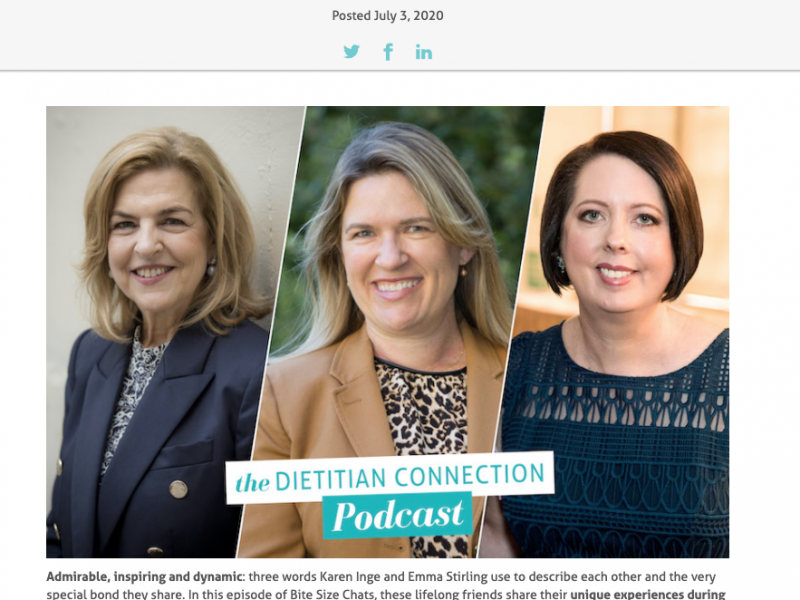International nutrition expert, Dr John Sievenpiper from the University of Toronto, graced Australian shores last week to attend the International Congress of Diabetes in Melbourne and he also made a short stop in Sydney to present at the Sweet Symposium on the heavily debated topic of fructose. Dr Sievenpiper made it clear that he didn’t want to convince us of any particular view, but wanted to show us the scientific evidence on fructose. While I’ve been teaching cooking and nutrition in Tassie I asked our guest dietitian and research expert for her outtake:
About our expert: Dr Flavia Fayet-Moore is a nutrition scientist and APD with a special interest in dietary intake assessment, nutritional status, eating behaviour and nutrigenomics. Flavia is currently director of Nutrition Research Australia and director of operations for Nutrigenomix Australia. When she doesn’t have her nose in a scientific journal, she loves cooking and balancing all the eating with a good dose of surfing, yoga and competitive squash.
Dr Sievenpiper showed us that if you classify studies based on their design, then the effect of fructose on cardiometabolic factors such as blood pressure and weight are quite clear-cut.
The first type of study is what scientists call ecological studies. These studies merely show associations between one factor and another at one point in time, but they are quite useful to help scientists come up with theories (like fructose is toxic). Much of the evidence on the mechanism that fructose could be toxic comes from animal studies, but in humans only 3% of fructose gets converted to fat when you overfeed people with it, whereas in animals it’s 60%. So we have to be very careful how we interpret these animal studies. Dr Sievenpiper’s group recently completed a systematic review (massive summary) of all ecological studies. Thousands of studies were included here, relating fructose to various diseases. The only association they found was with gout. His take home message: there was no clear relationship here. Watch this space, as it should be published soon!

When he looked at the second type of study, where you follow people over time, there is consistent evidence that sugar-sweetened beverages are related to obesity. Dr Sievenpiper commented that people who have these beverages tend to be less active, smoke more and eat more calories (Malik 2010 Diabetes Care). Another commonly quoted theory is that when people have liquid calories it makes them eat more. The evidence for this is true in the short-term, but not in the long term (Almirion-Roig Nutr Rev 2013), so that doesn’t explain it completely. Lastly, it could be that fructose in the drinks are the culprit. But we know from his review that that’s not the case either.
Now the third type of study is the ‘gold standard’ where you are actually testing the theories and controlling for other factors that can influence the results. In these ‘controlled trials’, the design is what influences the outcome. If you add extra kilojoules to the diet (i.e. extra soft drink per day), then fructose promotes weight gain and affects blood lipids. However, these effects are related to the additional energy (kilojoules) added to the diet, rather than fructose itself. In studies where you replace the fructose kilojoules with something else, then no cardiometabolic effect is seen. The same happens when you take away the kilojoules (tell people not to have the soft drink).
Take home message
His take home message? If fructose is not contributing additional kilojoules to the diet, then there is no signal for harm. There was actually some evidence to show fructose may benefit blood pressure and glycaemic control and this links back to work done in the 1990’s showing that if fructose is given in the same amount as that found in fruit, then it actually helps with blood sugar control. Dr Sievenpiper said that we need to focus on how many kilojoules we consume and how much we exercise, rather than individual nutrients such as fructose.
Panel perspectives
With the popularity of sugar-free fads at the moment, it wasn’t surprising to hear Dr Rebecca Huntley’s consumer research showing that almost 30% of people surveyed in a large quantitative study of over 3000 Australians said reducing fat and sugar was their top priority in the year ahead.

Dr Gina Levy presented new data which revealed that there has been a decrease in sugar soft drink purchases between 1996 and 2011: “Nearly one in two drinks consumed are now non-sugar varieties” Dr Levy said. We’re increasing intake of diet soft drinks and at the same time, our bottled water purchases have quadrupled between 1996 and 2011.
Possibly the most valuable part of the symposium was the engaging discussion with presenters and nutrition experts Dr Joanna McMillan and Dr Cyril Kendall. A key theme from the panel discussion was the need to look at diets as a whole rather than vilify single nutrients or single foods. We need to move away from a long list of prescriptions of no’s and nutrient based guidelines. The message for the audience was to reinforce what foods people should be eating and that we need to learn to do the maths in our head…if you have a soft drink with dinner, skip dessert. If you love your dessert, have water with your dinner. It’s as simple as that.
Disclosure: The symposium was supported by Nutrition Society of Australia (Sydney group) and sponsored by Coca-Cola South Pacific.
Editor’s comments:
Thanks Flavia, so fantastic to have you unravel the science in simpler chunks for us. And I couldn’t agree more with the conclusion to focus on fabulous, delicious, healthy, foods to include in our diets. What say you lovely readers?


